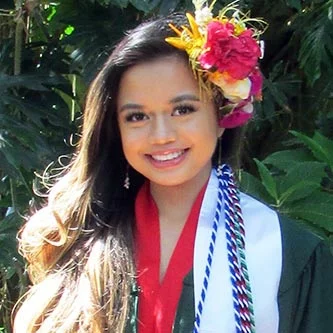Graduate Certificate in Conflict Resolution (GCCR)
The GCCR allows graduate students and working professionals to study the theory and practice of conflict resolution and develop skills that are valued in a wide range of professions, including public administration, business, law, education, social work, urban planning, and human resource management. The GCCR can be pursued as a separate academic program or earned concurrently with a JD, MA, MPA, MS, MEd, MBA, MPH, MSW, PhD, or any other graduate degree.
Learn more about the Matsunaga Institute for Peace.

What was your fondest memory at the Matsunaga Institute?
During my facilitation class (PACE 668 “Facilitating Community and Organizational Change”), our final assignment/project as a class was to facilitate a summit for Malāma Mānoa. Each group was responsible for a specific part of the meeting. Therefore, our whole class got to work together to lead a meeting of about 100 people, and I believe it turned out amazing at the end. It was a wonderful learning experience that I was glad to be a part of!
Justine Kuna Sison, 2022
MA in Communication (In Progress); Graduate Certificate in Conflict Resolution
Additional Details
The GCCR requires the completion of 15 credits, including:
A Foundational Course in Negotiation, either:
- PACE 629/PLAN 629: Negotiation & Conflict Resolution *
- LAW 508: Negotiation and Alternative Dispute Resolution (2 credits)
- MGT 660: Negotiation
A Culminating Project, either;
- PACE 695: Conflict Resolution Practicum (Practicum Planning Guide)*, or a
- PACE 699: Directed Reading and Research (Capstone Paper Guidelines) *
Approved Electives
- PACE 621/PLAN 621: Environmental Conflict Resolution *
- PACE 637/WS 647/ LAW 547: Gender: Law and Conflicts
- PACE 647: Mediation: Theory and Practice *
- PACE 650: Dispute Resolution System Design
- PACE 652/EDEA 652: Conflict Management for Educators *
- PACE 660: Family Mediation
- PACE 661/PLAN 661: Collaboration Between Sectors
- PACE 668/PLAN 668: Facilitating Community and Organizational Change
- PACE 690: Topics: Conflict Theory
- PACE 790: Advanced Topics: Conflict Theory
- PLAN 627: Negotiation & Mediation in Planning
- POLS 633: International Conflict Resolution
- POLS 634: Teaching Model United Nations (1 credit)
- POLS 635E: International Organization
- LAW 529: Peacemaking
- LAW 590M: Mediation Clinic (2 credits)
Additional Courses (maximum of two, permission required)
- PACE 420: Introduction to Human Rights *
- PACE 429: Negotiation *
- PACE 447: Introduction to Mediation *
- PACE 468: Introduction to Facilitating Organizational Change *
- PACE 477: Culture and Conflict Resolution *
- PACE 478: International Law and Disputes *
- PACE 480: Managing Human Conflict *
- COMG 455: Conflict Management *
Notes
- Successful completion of the 15-credit GCCR requires a grade point average of 3.0 in courses taken for a letter grade.
- Every course counted towards the GCCR must be taken for a letter grade unless the course is only offered on a Credit/No Credit basis.
* Distance learning (online) is available.
Interested students should carefully review and satisfy the following:
Deadlines
- March 31 for Fall admission
- October 31 for Spring admission
Applications received after these dates will be considered case-by-case as space allows. Rolling admissions are available.
Application Process
The application process has two steps:
1) Complete Online Graduate Application
Prospective GCCR students, including unclassified students and those earning the certificate concurrently with another graduate degree, must complete the online application as provided by Graduate Division. All questions concerning the application and associated requirements should be directed to Graduate Division. There is an application fee. GRE exam results are not required.
2) Submit Supplemental Documents
Applicants must submit the following documents, if applicable, to the Matsunaga Institute:
- Resume/CV
- Letter of interest indicating:
- Why you are interested in the GCCR; include your conflict resolution experience and/or goals for participating in the program, and
- Your long-term goals, both personal and professional
- TOEFL scores: For students from non-English-speaking countries the minimum scores are 600/100 (paper/internet).
- View and submit the GCCR Supplemental Documents.
3) Solicit Two Letters of Recommendation
- One professional letter from an employer, project supervisor, or affiliate in an organization, and
- One academic letter from a faculty member or academic department head who is familiar with your record and can credibly comment on your ability and performance as a graduate student.
- Applicants must identify and provide valid emails for their letter writers on the GCCR Supplemental Documents form.
- Upon form submission, the letter writers will be notified of your letter request via email and provided with a link to a Letter of Recommendation submission form.
- Prior to submitting the GCCR Supplemental Documents form, ensure that your writer has agreed to write a letter on your behalf, and after submitting this form, notify your writer to be on the lookout for the letter request email sent by the form system.
- Applicants must ensure that their letter writers are aware of their target application deadline and that letters are submitted by that deadline.
Questions regarding parts 2 or 3 of the application process should be directed to the Matsunaga Institute (uhip@hawaii.edu).